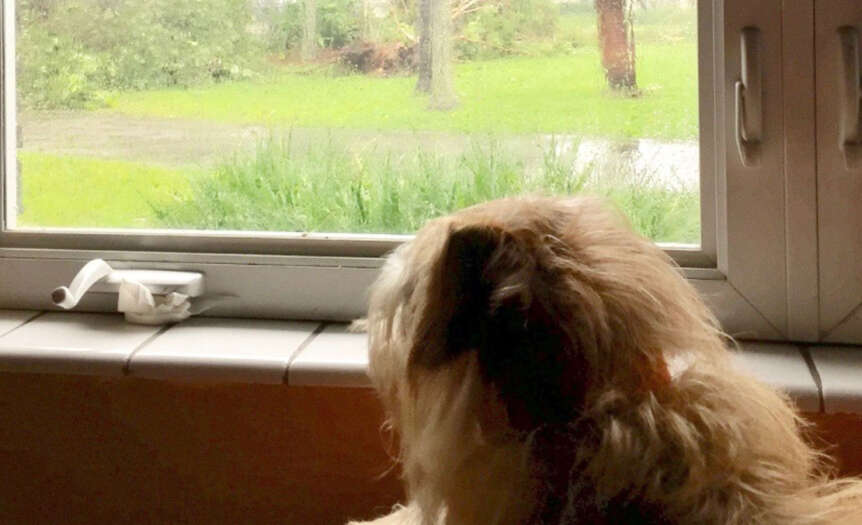Pets are a part of the family and, as such, must be included in hurricane emergency plans. The time to start planning is now, before a hurricane is imminent. Leaving your pets to fend for themselves while evacuating during a natural disaster is not an option. If boarding your pet, call a reputable facility in advance and make a reservation early. These get full very quickly. Few hurricane shelters allow pets, apart from service animals in company of the owner with a disability. If planning to evacuate to a hotel, call ahead and make sure that it accepts pets. If staying at home, find a safe room in the house to be with your pet while the storm passes. Once you have planned for a safe place for your pet, follow this checklist to make sure you have everything needed to ride out the storm.
Hurricane Season Checklist for Pet Owners
- Obtain calming products for your dog or cat.
- Animals are sensitive to the drastic changes in the atmosphere during a climate event. This can lead to severe anxiety. An anxious pet may injure itself or may try to run away and get lost. The use of antianxiety supplements, calming hormones, and/or antianxiety shirts should be considered. For pets with severe anxiety, consult with your veterinarian to see whether anxiolytic medications may be appropriate.
- Refill any prescription medications or prescription diets as soon as an approaching hurricane has been announced.
- Prepare a “Pet Hurricane Kit” containing one week’s supply of the following essentials:
- Food: Canned food is preferred, since it contains more water, so your pet will be less thirsty. Avoid getting a different brand of pet food from what your pet usually eats. We don’t want an animal with diarrhea during a hurricane.
- Fresh water
- Bowls for food/water
- Vaccine records and county tag
- Photo of the pet (in case she/he gets lost)
- Leash
- Crate or cage
- Favorite blanket and/or a preferred toy
- Cleaning products for possible potty accidents
- Towel
- Bandage and gauze for potential minor injury care
- Pee pads for indoor elimination
- Microchip your pets for permanent identification and make sure they are wearing a collar with name tag and phone number.
- Visit your veterinarian for a complete checkup.
- This is particularly important in the case of older pets with multiple medical conditions. Request a copy of your pet’s medical records in case your pet needs to visit an emergency clinic in the days after the storm hits.
- Consider vaccinating your pet for leptospirosis.
- It is known that the incidence of this zoonotic disease increases after natural disasters. Avoid standing water when out with your pet after the storm passes.
Avoid the temptation to take your dog for a walk during the calm “eye of the hurricane.” It is still dangerous. After the hurricane passes, the floods, downed electrical lines and storm debris create a dangerous environment for your pet. When making a decision for your pet during or after a hurricane, always remember: If it is unsafe for you, it is unsafe for your pet.










 Deering Estate
Deering Estate
 Massage Envy South Miami
Massage Envy South Miami
 Calla Blow Dry
Calla Blow Dry
 My Derma Clinic
My Derma Clinic
 Sushi Maki
Sushi Maki
 Sports Grill
Sports Grill
 The Healthy Kitchen
The Healthy Kitchen
 Golden Rule Seafood
Golden Rule Seafood
 Malanga Cuban Café
Malanga Cuban Café

 Kathleen Ballard
Kathleen Ballard
 Panter, Panter & Sampedro
Panter, Panter & Sampedro
 Vintage Liquors
Vintage Liquors
 The Dog from Ipanema
The Dog from Ipanema
 Rubinstein Family Chiropractic
Rubinstein Family Chiropractic
 Your Pet’s Best
Your Pet’s Best
 Indigo Republic
Indigo Republic




 ATR Luxury Homes
ATR Luxury Homes


 2112 Design Studio
2112 Design Studio
 Hamilton Fox & Company
Hamilton Fox & Company
 Creative Design Services
Creative Design Services
 Best Pest Professionals
Best Pest Professionals
 HD Tree Services
HD Tree Services
 Trinity Air Conditioning Company
Trinity Air Conditioning Company
 Cisca Construction & Development
Cisca Construction & Development
 Mosquito Joe
Mosquito Joe
 Cutler Bay Solar Solutions
Cutler Bay Solar Solutions


 Miami Royal Ballet & Dance
Miami Royal Ballet & Dance
 Christopher Columbus
Christopher Columbus
 Pineview Preschools
Pineview Preschools
 Westminster
Westminster
 Carrollton
Carrollton
 Lil’ Jungle
Lil’ Jungle
 Frost Science Museum
Frost Science Museum
 Palmer Trinity School
Palmer Trinity School
 South Florida Music
South Florida Music
 Pinecrest Orthodontics
Pinecrest Orthodontics
 Dr. Bob Pediatric Dentist
Dr. Bob Pediatric Dentist
 d.pediatrics
d.pediatrics
 South Miami Women’s Health
South Miami Women’s Health

 The Spot Barbershop
The Spot Barbershop
 My Derma Clinic
My Derma Clinic




 Miami Dance Project
Miami Dance Project

 Rubinstein Family Chiropractic
Rubinstein Family Chiropractic
 Indigo Republic
Indigo Republic

 Safes Universe
Safes Universe
 Vintage Liquors
Vintage Liquors
 Evenings Delight
Evenings Delight





 Atchana’s Homegrown Thai
Atchana’s Homegrown Thai
 Baptist Health South Florida
Baptist Health South Florida

 Laser Eye Center of Miami
Laser Eye Center of Miami
 Visiting Angels
Visiting Angels
 OpusCare of South Florida
OpusCare of South Florida

 Your Pet’s Best
Your Pet’s Best





 HD Tree Services
HD Tree Services
 Hamilton Fox & Company
Hamilton Fox & Company


 Creative Design Services
Creative Design Services